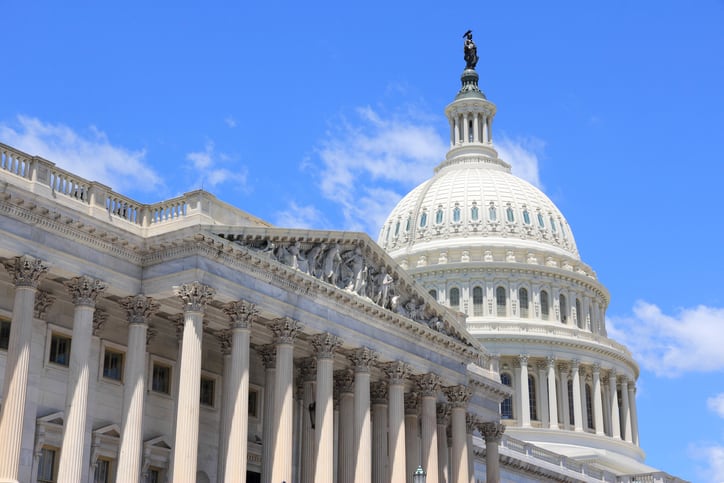The Washington Report is just one session out of a full program of panels, workshops, meetings, and networking opportunities that comprise the organization’s annual meeting event. PCPC membership is some 600 companies deep and includes prominent multinationals like Unilever, Mary Kay, and Amway as well as contract manufacturers, ingredient suppliers, packaging companies, and consumer media companies.
What follows are excerpts from the 2019 PCPC Washington Report panelists’ remarks—an abbreviated year-in-review.
Mike Thompson, senior vice president of government affairs: “The Trump administration withdraws us from international agreements [and] states and local governments are filling the void,” says Thompson, “especially what I would call the nation-state of California.”
California “is really setting the tone worldwide,” believes Thompson, who also notes, “we’re seeing a lot of issues going beyond the state level to the local level.”
Lisa Powers, executive vice president of public affairs and communications: “The last 14 months has been a time of energized advocacy….I think the current political environment has made people distrustful of each other; less tolerant of differing points of view, and it make communicating that much more difficult when you’re trying to get out the facts (certainly scientific facts),” acknowledges Powers.
She went on to share data and insight from the most recent Edelman Trust Barometer that support her more anecdotal remarks. Edelman has created the report for nearly 20 consecutive years; and the firm’s findings includes data gathered from some 27 countries.
“There’s a real divide between the informed public and the general public,” says Powers, “and certainly there’s a divide among gender, with women trusting less. From a comms standpoint it makes it harder to get out a positive narrative…that is grounded in sound science and facts.”
Tom Myers, executive vice president, legal and general counsel: “Federal efforts to roll back certain regulations have really spurred the states to try to counteract those measures…left-leaning states in particular really present themselves as a counter balance to the president’s agenda,” notes Myers, adding “we’re going to see increased regulatory activity at the state level.”
“The President has really packed the federal judiciary…with close to 90 appointments now, including 2 US Supreme court justices, 30 court of appeal judges, and somewhere between 50 or 60 on US district courts—these are lifetime appointments, essentially.”
“I think that the appointment of conservative judges to a lifetime position on the federal bench is going to do more to impact the fabric of this country than almost anything else,” concludes Myers.
Francine Lamoriello, executive vice president of global strategies: “The mission of our global advocacy work is to really try to open up market access for our members to be competitive around the globe, to try align regulatory policies for cosmetics, and to promote free trade,” explains Lamoriello. “Our efforts,” she says, “are really looking to try to leverage us government trade policy and to have the us government support our industry’s objectives”
“On the positive side, the administration has tried to negotiate free trade agreements with a number of partners…renegotiate the NAFTA, which is now the US, Mexico, Canada agreement. And I’m happy to say we had a very successful effort there, working with our partners in Mexico and Canada …to achieve a very very strong cosmetics annex that is going to have a lot of benefits for our industry.”
“And the admin has announced intentions to negotiate free trade agreements with Japan…with the European Union and possibly with the UK after the UK leaves the European Union….We’ve been promoting the reform of cosmetics regulations in China. Here we have the support of the US government”
“On the more negative side,” says Lamoriello, “the administration has really been using retaliatory tariffs …to achieve trade objectives and reduce the US trade deficit. In march, the administration announced tariffs across the board in small countries on imports of steel and aluminum based on national security grounds. And countries retaliated; so we have faced higher tariffs on cosmetics exports to the European Union, to Canada, to Turkey…”
“With China, there’s been 3 phases of tariffs and counter retaliatory tariffs with china, and that’s been affecting our industry a great deal,” emphasizes Lamoriello
Alexandra Kowcz, executive vice president for science and chief scientist: “Fake news has now evolved to fake science and it just makes the scientists absolutely crazy.”
“The government shutdown really disrupted many of the national labs and many of the scientific programs …you have certain endpoints and deadlines you have to meet and 3 to 4 weeks makes a very vast difference when you’re working on a specific scientific program,” explains Kowcz.
“As an example, the National Science Foundation [looks] at their grant proposals in January. They suspended the review of these grant proposals…from our standpoint, we’re hoping we don’t have any more of these shutdowns”
Mark Pollak, senior executive vice president and chief operating officer: “On the federal front, congress did make significant progress last year on cosmetics reform legislation. The Senate health, education, labor, and pensions committee negotiated and released a bipartisan discussion draft of comprehensive cosmetics reform,” reports Pollak. “They also held stakeholder meetings and engaged the FDA for technical assistance during the committee process.”
“However,” says Pollak, “as the midterm elections approached, Congress was not able to resolve every issue and our legislation basically got stuck before the end of the year.”
Further discussion: the panel then discussed priorities for the remainder of 2019, which follow quite closely with each speaker’s perspective on the past 12 months.
---

Deanna Utroske, CosmeticsDesign.com Editor, covers beauty business news in the Americas region and publishes the weekly Indie Beauty Profile column, showcasing the inspiring work of entrepreneurs and innovative brands.

